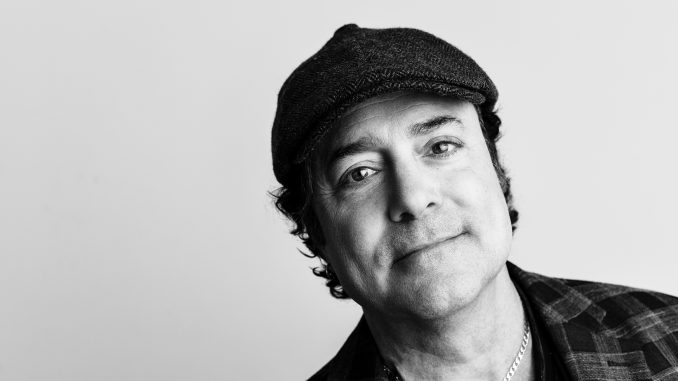
The UNarmed American fires a shot he hopes will be heard ‘round the world.
In early 2025, two hundred and fifty years after Ralph Waldo Emerson wrote the immortal line, “the shot heard ‘round the world,” the artist known as Mickelson will release his fifth solo album and tenth if you count the five he made with the band Fat Opie. “If You Can’t Be Right, Be Loud” is the call-for-action title this San Francisco artist has chosen. Judging by the two singles already out and three other tracks pried from his vaults, it’s going to be a worthy successor to “Known to Be Unknown,” the 2022 album that helped to put him on the world’s stage in the UK and Europe and unlocked doors for subsequent tours of Australia and later on this year in Japan.
Mickelson is no Ugly American as in the 1950s political novel by Eugene Burdick and William Lederer about a pretentious US ambassador to a fictional country in Southeast Asia meant to resemble Vietnam. No isolationist, Mickelson finds the people of other countries warm and receptive to his brand of alt-rock, singer/songwriter music. “I’ve found they treat artists with respect in other countries,” he states with conviction, looking forward to the next tour which kicks off in the Netherlands in late October before skipping over to Japan in mid-November. He loves to travel and has found a way to mix business with pleasure. When a tour is over, sometimes his wife and daughter will join him for a few days to wind down and explore other cultures.
Scott Mickelson was his given name growing up in Massachusetts. “I used to be called Mick in high school,” he recalls. The girls called me Scott, though. Now, I just say Mickelson simply because it’s shorter and easier to use in promos.”
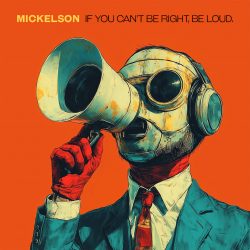
His music is original, adventurous and conflicted in a punk meets Americana folk sort of way. He’s just finished working on the artwork for the cover of “If You Can’t Be Right Be Loud” while eagerly awaiting its release. Some if not all of its songs will be played in Europe and Japan, and Mickelson hopes they will be heard around the world in however long it takes, 80 days or 80 months, to bring his music full circle triumphantly back to one expects a more appreciative American audience.
You are touring considerably in Europe, Australia, and soon Japan. Have you found audiences more responsive to your music outside America? Why do you think that is?
I’ve been touring in the States for decades. But I’ve also spent a lot of time in the UK and Europe, and I find the listeners are perhaps more sensitive, engaged, and excited to see live music. Here, I mean I’m not at a level to play huge venues, so when you’re playing in clubs the venues really don’t give a shit. They do zero promotion; they don’t pay, and it’s depressing. Over there people have respect for live music. I mean, I can play around the Bay area, Seattle and it’s fun. In the United States everything is so hyperactive, so for an artist getting older, once you get past 25 you’re sent out to pasture unless you’re famous, a legend. Outside of America, if you’re a veteran musician, that’s seen as a good thing. It’s a whole different perception.
What country has been a great experience for you?
I like Germany. The Germans are very enthusiastic, generous, they take care of the artists. The venues accommodate you and give you dinner. They are glad you’re there. You can sell a lot of merch. They love the banjo stuff.
What’s it like playing in Australia? Are you booked into larger venues?
No, the size of the rooms is about the same as the States. People are very friendly there. And there’s a ton of live music. In Melbourne, there are almost too many bands and too many venues. There’s a glut of music.
Recently, I spoke with Al Carr and he was telling me how Melbourne is the hub for music in Australia, like the Nashville of Down Under.
Yeah, it’s really lively and youthful, fun to be there.
You have a new record coming out soon. When will that be released?
The guy who is going to master the album, Bob Weston at Chicago Mastering, is backed up so I’m waiting my turn. As soon as I get the production date that will determine when it’s released. Instead of rushing to get it out by December, I may as well wait until early 2025.
You are still planning to make CDs (crossing fingers), aren’t you?
Yes, I always make them. People in the States don’t buy many of them, but overseas they buy more along with shirts and LP’s. They still have CD players in their cars. And they’re not into streaming. All musicians really took a hit when streaming became the thing here.
I’ve heard you have Colin Moulding from XTC playing on the album.
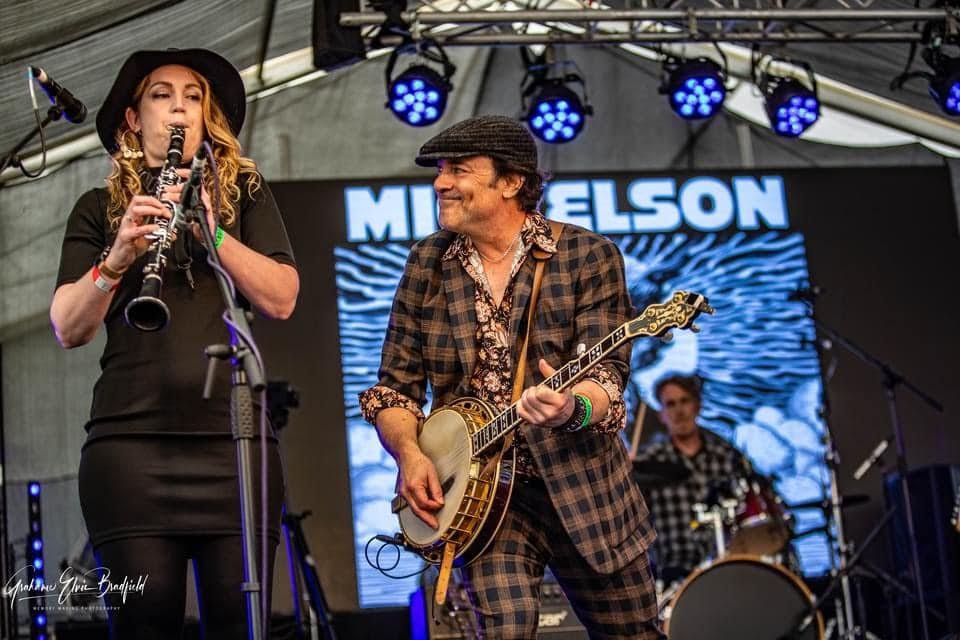
He played on ‘Only Gray Matter Boiling in My Head’ which has already been released, and he’s also on one from the new album that hasn’t been released, ‘Blue is the Warmest Color.’ His son, Lee Moulding, plays drums and Jon Buckett is on keys. In fact, the whole band is in Swindon, England, which is the home of XTC.
‘Only Gray Matter ..’ does seem to have an XTC feel to it. Of course, I had that information in my brain before listening so the dots are prone to connect.
When I knew I’d have Colin on the record, I chose something I thought he could really step into. When you’re working with people who are really well-known for their craft, I wouldn’t pick him to play on something his band doesn’t do. That would be a waste of time, money and energy. I started writing the song and then it went in the direction it was supposed to go in. That’s the way all my songs are written.
While reading through the notes for ‘Jump off the Earth,’ a particular line was curious – “landing with the impact of a raindrop on Jupiter.” That doesn’t seem like much of an impact.
That was probably a publicist I hired who wrote that. But now that you say it, I’m angry.
The line “every minute is a minute gone” comes off like the old adage “a penny saved is a penny earned.” Did you mean every minute “wasted?”
Not necessarily. It means you can’t wait around to make decisions. Time is always moving, so if you’re putting something on hold to make a decision, you’re really just wasting time.
So, it’s more about making the best use of your time on the planet?
Yeah, though in my case it’s ruminating over things that have happened and not making the changes necessary to address them. It’s like being a deer in the headlights, just stuck while time is marching onward.
How does that relate to the single, ‘Jump off the Earth?’
Do you remember the video games like Galaxo when you hit hyperspace and just go? You could make a decision that could change your whole life in a split second. In the video for that song, I wanted to use AI, but the more programs I tried all looked the same and that wouldn’t work. Everybody using those programs would come up with basically the same song. Then I found this guy in Germany who was doing short animations, so I started sending him prompts and he’d send back short clips that I edited into the finished video.
People today want to put you in a little box that fits your identity. It’s the same with a musician, but your music is harder to classify. What would you call it?
That’s been a problem for me from Day One. When I write music, it’s in a vacuum. I don’t try to emulate anyone. When I was a kid playing guitar, I might have wanted to sound like Neil Young. I was signed to a label in L.A. when I was around 21, or 22, and they wanted us to sound like WHAM. I was so hungry to get a record deal, something you need to do to be successful, and then I completely regretted that. There was another time in the early ‘90s when everyone was getting grungy-sounding, and I was thinking Neil Young & Crazy Horse. People said I was just following that trend. When that happened a couple of times, I just decided to write the way I wanted. I don’t listen to any contemporary music at all and I haven’t for decades. The newest band I’ve listened to is Radiohead and that’s going way back. You know, I’ll listen to The Rolling Stones or Ray Charles because that’s irrelevant to what I’m doing. But I’m honest about what I write.
Venues booking musicians or bands like to know what they’re getting, which is why they request demos if they’re not aware of someone.
It’s easier if you’re a blues band, punk, country, rock or reggae, to get booked, but that’s not what I do. I’m an old-school songwriter. Bowie was cool, eclectic, and did his own thing. There I get comparisons because I have deep vocals and do things that sound a little like him. Really, I don’t know what or who I sound like. Every record sounds different.
The first record of yours I bought was “Known to be Unknown.” I popped the CD in and the first notes I heard on the song ‘UNarmed American’ were what sounded like a cross between banjo and guitar.
There’s another song on the record called ‘Only Ugly When You Cry.’ On the last 20 seconds of that song, I was thinking this is a cool groove so I took a loop of that and looped it with whatever banjo was playing at the same time. I just wrote the song from that. And I needed another song for the record, so I did an acoustic version at the end. I’ve been a little guilty on the shorter side on my last few records because I produce so much and have less time to write.
There are a couple of instrumentals on the record.
Yeah, I ran out of tracks and manufactured them. On my next solo record, though, I’ll have ten vocal tracks.
‘Unarmed American’ appears to be about school shootings. “I’ve got an itchy trigger finger but I only kill with kindness.” The phrase is repeated in a powerful passage from ‘Only Ugly When You Cry’ that goes: “I’d like to kill you with kindness, I’ve got an itchy trigger finger, If I could find you in this darkness, I’d be the greatest gunslinger.” That phrase must be important, “kill with kindness.”
Well, it’s the opposite of shooting someone, right? In fact, I did have a trigger finger at the time, but I had to get surgery on it. “Trigger finger’ was literal in that my hand was in bandages. I like to play with somewhat clichéd phrases that are polar opposites and putting them together is kinda clever.
Does ‘Go to Bed Hungry’ reference the cover art with the yellow jackets making a beeline (speaking of clever) towards your wide-open mouth?
There’s probably something to that. By the way, I did get voted in Germany for having the worst album cover of the year. I’m proud of that. But the song is very personal. If you’re in a long-term relationship trying to keep the magic alive, like in this case, when you get older food replaces sex. You figure out ways to get around things and replace them with others but still have the same hunger. As for the album cover, I tend to say or write things that can be provocative. It’s like kicking the hornet’s nest.
In ‘Go to Bed Hungry,’ you write: “We go to bed hungry and we wake up hungrier, I am maintained but only dusted, Self-sustained until I’m busted.” You have a gift for that witty, wry humour that’s like Nick Cave’s, for example.
Well, laughter is good, right? It’s like we’re taking care of stuff but not all the way. Maintained, dusted but not really clean, do you see?
Why is the title of ‘Unarmed American’ stylized with capitals UN?
I felt like people weren’t really seeing it with just the capital “U,” so I wanted to emphasize it more. There are people who are very into guns. I mean, there are 330 million Americans and over 400 million registered guns. And that’s just guns that are registered. You’d think that Americans are against gun laws when in fact, 70% of Americans wish better gun laws were in place. The biggest voice is the NRA and hard-core gun owners. What I’m saying is: We unarmed Americans don’t want lax gun laws, and we’re the majority. I’m trying to give voice to that side. I’m not anti-gun but it’s obvious there needs to be change. Weapons made for combat shouldn’t be bought and sold. In England, you can’t have guns. In Australia, they bought back guns from people. I think it’s a pathetic part of our culture. There’s a murder, I think, every eleven minutes, and we will just not do anything about it.
The NRA looks at the issue as give an inch and the government will take a mile, and maybe that’s a good argument. Therefore, they don’t want to budge.
I don’t know if it was in the ‘70s or ‘80s, but there was a time when the AK-47s were illegal to own. Now, it’s omigod you can’t take our guns away. Well, a lot of these mass shootings are with automatic weapons. It’s time to stop this.
Your album cover art and posters have some very unusual artwork. They remind me of the surrealist work by one of the great artists, René Magritte. Who does your cover artwork?
I do all my art. My degree was in illustration, and that’s all I did during the eight years I quit music.
One of the instrumentals is titled ‘Chicago Transit Authority,’ the original name of the band Chicago. When I first heard their record, it knocked me out. It not only rocked but featured a great horn section. Were you into that band at all?
I grew up listening to stuff like that. And it’s fun working names from old bands into my song titles. On the “A Wondrous Life” album I have a song (‘B. Wilson’) dedicated to Brian Wilson. And on “Known to be Unknown” there’s also a 1-minute instrumental called ‘A Blur in the Memory.’
You are doing quite a bit with horns and orchestration compared to most of the contemporary music these days.
I love that sound. I listen to a lot of Ray Charles, and early Van Morrison. On the new album, there’s a song called ‘Stop Me from Sinning’ that has a horn section. On ‘Known to Be Unknown’ my daughter Sadie played cello, and it gave me an excuse to have her on the record. I love arranging for horns even though I don’t read or write music, so it’s all coming out of my head.
Sometimes learning how to read music before you play the music can work against you.
The best analogy I can come up with is art school. It was formal training, like eight hours of drawing still life and perspective. It wasn’t a conceptual school. I learned how to draw, to use colour and light, but that doesn’t make you an artist. It makes you a craftsman. It’s the same with modern music. You can learn the technical stuff and all the lingo, but it doesn’t make you a musician. It teaches you a language, the ability to read and write in that language, but it doesn’t make you a creator. With music, I started so young and it came very natural to me, so I didn’t have time to think about it.
For your covers and posters, what is the original format you use for design?
I’ll never tell.
Come on, why not? Are they computer-generated?
They are on the computer, but you have to have some classical training to know how you want something to come out. Eventually, it has to be a digital file for reproduction and printing.
What about the “Known to Be Unknown” cover with the bees?
I had my photographer take some profile shots of me, and I bought a nest on eBay. Then I bought a box of twenty dead bees and photographed them on a white background, cut out each bee, cut out the nest and comped it all together. The concept was supposed to be: Are the bees getting into me to say the stuff that’s controversial or am I feeding the nest? Who was starting what? With art, like anything else, the concept can be great, but that doesn’t mean the result is great. Now, I’m going to have to start thinking about my next cover.
Hold on! Somebody really sells or auctions empty bee nests on eBay? And where do you go to buy a box of dead bees? Never mind. The title is going to be “If You Can’t Be Right, Be Loud,” right? And there is a song by that title.
I think that was the first song I wrote since the last record. It’s about politics, the state of our nation in three-and-a-half minutes. It’s a continuation of a theme I started on ‘Jagged Tooth’ about Trump-ism, the excessive lying, if you say it loudly enough it becomes fact. I don’t try to be a political writer but it does come out, and that one flowed pretty easily. If you can’t be right, be loud, if you can’t be seen join a crowd. People who are susceptible to conspiratorial notions find comfort in others who live in that world, too. If you can’t be heard hold a sign. That’s obvious. If you’ve got nothing to say, grow a spine. That’s straightforward.
Another one of the songs you sent from the new album, ‘Glowstick’ really stood out. It glowed. Lots of stuff breaking: “throw like red brick window, place feels like a crime scene, break it like a glowstick, let neighbours know I’m breaking out.
I don’t talk about this much, but I’ve been clinically depressed for basically my whole life. I wasn’t diagnosed until I was forty, and I’ve been on medication for fifteen years. Every time I perform, I look out and know that a percentage of those people are suffering from depression, and they relate to the song right away without me even talking about it. With depression, it’s one thing if it’s circumstantial, you lose a loved one or get fired from your job. With the other, you get shifts in your psyche for no apparent reason and it just turns on. You’d do anything to turn it off and get clarity again. At one point, I was diagnosed as bipolar but I never was. I don’t get up, just down. When it’s bad, I can’t even be with my own wife or kid.
On ‘Only Grey Matter …,’ the brain is boiling, pissed off. “I would rather play Russian Roulette than to ever forgive or forget.”
Well, the song is tongue-in-cheek about being easily triggered and pissed off. Like, just ignore it because it’s grey matter boiling in my head. Some people are very reactive to things, the bark is worse than your bite type. I’m talking about holding on to grudges. I’m letting out some of my less than perfect personality traits in that song.
Fat Opie was the band you were in prior to going solo. I get the impression there just wasn’t freedom enough for you to express yourself fully.
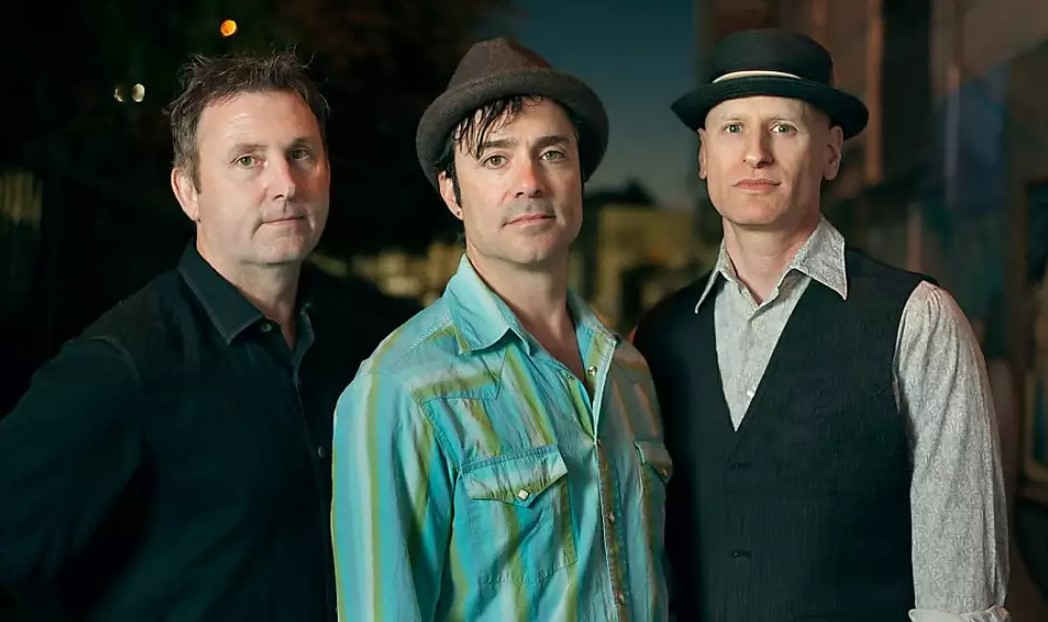
We were together for eight years, all of us in our twenties. It’s that golden time in a musician’s life when you have all that energy, got a band, go on tour, sleep on the floor, all that fun stuff. We had some success and signed with Neil Young’s management. I was the singer/songwriter of the band.
That must have been a kick while it lasted. You mentioned Neil Young’s “After the Gold Rush” as the first record you bought.
He was a big influence. I used to tack his LP covers on my wall.
In the end, it didn’t work anymore.
No. I don’t think we ever really got along. Actually, didn’t really like each other much. On the third record, we won a national band search for MTV. We had these signposts, things happening that were keeping us together. Like we did a showcase in the office of Columbia Records. But when that didn’t pan out, we said let’s just finish out the gigs we had and call it a day.
Where did the band name come from?
We were joking around and talking about this character Opie from “The Andy Griffith Show” who was eating too many biscuits and getting fat.
Let’s talk a little about these benefit albums you’ve produced: “After the Fire” and “Blanket the Homeless.”
The first really big California fire happened in Santa Rosa. We didn’t know at the time that there were going to be subsequent fires, a new age of fires every summer because of global warming. Santa Rosa is close and I knew people that had been affected. So, I got in touch with fifteen singer/songwriters and financed and produced the album. Each artist came in for a day and did a song, mostly solo acoustically. We raised thousands of dollars. That was cool.
One of the artists I was producing, Ken Newman, loved “After the Fire” and wanted to do something similar for the homeless. I said I’d love to do it but I needed to be paid this time. The other one took so much time and money that I couldn’t afford to tour. “Blanket the Homeless” was more of a band compilation. It had Goodnight Texas, Fantastic Negrito.
What’s your take on the homeless problem in San Francisco? You see all these spots on TV with people sleeping on the sidewalks, needles, faeces, tent cities. It’s not a pretty picture of the famous City by the Bay.
It’s a real problem. The Bay Area is a beautiful place to live. The climate is good, it’s tolerant. I don’t have the answer to why it’s as bad as it is, but it’s equally bad in L.A.
‘Jagged Tooth’ from the “Drowning in an Inflatable Pool” record has some very evocative lines. “So don’t string together the words that I’ve said, It’s like putting a Band-Aid on a broken leg, I was doing my best to tell you the truth, but every time I cut my tongue on this jagged tooth.”
The person in that song is mechanically incapable of telling the truth. Everything that comes out is a free-flowing circus of lies. Of course, it’s my Trump song.
On ‘Ithaca,’ another song on the Drowning album, you accidentally run afoul of a Trump supporter.
I had taken a trip to Ithaca, New York to visit Cornell, one of the Ivy League schools, with my daughter, and that town prides itself on being extremely progressive and liberal. We stopped to have a bite to eat in a local restaurant. I made a comment that was anti-Trump, thinking that everyone around me would appreciate the sarcastic remark. This guy was the one person in town who was MAGA, and he started ranting and telling me all the conspiracy stuff. So, the song is about how you shouldn’t assume you’re with people who have the same beliefs as you do. Ironically, I was playing that song one night when this woman comes up, all defensive, and said she went to Cornell and for my information, it is the most progressive school in America. I couldn’t win either way. I don’t go out of my way to hurt someone’s feelings, but I’m always going to say what I want to say.
“My sarcasm did not take, So I waited for the words to come, We were divided in our goals, Hoping for the same outcome.” This is the first verse in ‘Ithaca’ and carries the obvious MAGA/Trump inference. How can two halves of American citizens see each other in such alarming ways that conversation becomes impossible? When were the lines drawn in indelible ink? Aren’t both sides partially to blame for the division?
It’s not as easy as saying why can’t we talk to each other when we’re not talking about the same thing. If the Democrats say the sky is blue and Trump says the sky is pink and the MAGA people believe him, where is the common ground? We’re not talking about the same thing.
The title of the record suggests something that’s not easy to do – drowning in an inflatable pool.
The song from the title is political in a sense. It’s actually very popular live. It’s like having this moment of clarity when all of a sudden you feel wise and have all the answers. When you’re in that frame of mind, just because you didn’t have a perfect day, it’s not the end of the world. To feel like everything is broken because you had a bad day makes as much sense as drowning in an inflatable pool. If you read the lyrics, almost every line is like a constructive piece of advice. It’s a very optimistic song.
What song from “Flickering” do you still play in your sets?
I play ‘Flickering,’ ‘Ten Ton Heavy Thing,’ ‘Hercules & Iron Man,’ ‘Call 911.’ Those songs have held up well for nearly a decade. ‘Hercules & Iron Man’ is really all about giving voice to the underdog. Some of the hardest working people get no recognition, like someone working two jobs and raising two kids. The people that get all the attention in our society are the celebrities. Iron Man is a character from comic books loosely based on mythology. These characters have God-like strength. I did some research for commonalities between some of the things each was said to have done.
On Bandcamp in tiny print under your bio it reads “recommended by.” Click on that and up comes two albums by Mick Shaffer and Marc Delgado. So, I looked up Delgado, read about him, and listened to some of his music. Next thing I know, two hours had gone by but it was worth it. Delgado is damn good.
That’s funny. I didn’t even know they were there. I produced Shaffer’s record and Marc Delgado is a friend of mine from New York. We were both playing in NYC at a place called Pianos. Upstairs they were set up for solo acoustic stuff. We became good friends.
I read in an article where you said: “My first concert was Elvis Presley. My parents took me to see Jerry Garcia and the Grateful Dead in 1974.”
I was at my friend’s house and his mother was a big Elvis fan. She loaded us up into her Corvette and drove to the Providence (RI) Civic Center where she bought tickets for a matinee show. We saw Elvis on his last tour in 1977 I think it was. My older brothers were Deadheads and I listened to a lot of their stuff. (changing to a stern voice) My father was very curious to know what this whole Grateful Dead thing was about. He got tickets and we went to see Jerry Garcia & Legion of Mary at the Boston Music Hall.
I learned that you like to read John Steinbeck’s books.
I read all his books. Years ago, though, when I was an avid reader.
One of the books is “Travels with Charley” where the author goes on this long journey all over America and winds up in Texas. He was dying at the time. Who do you travel with?
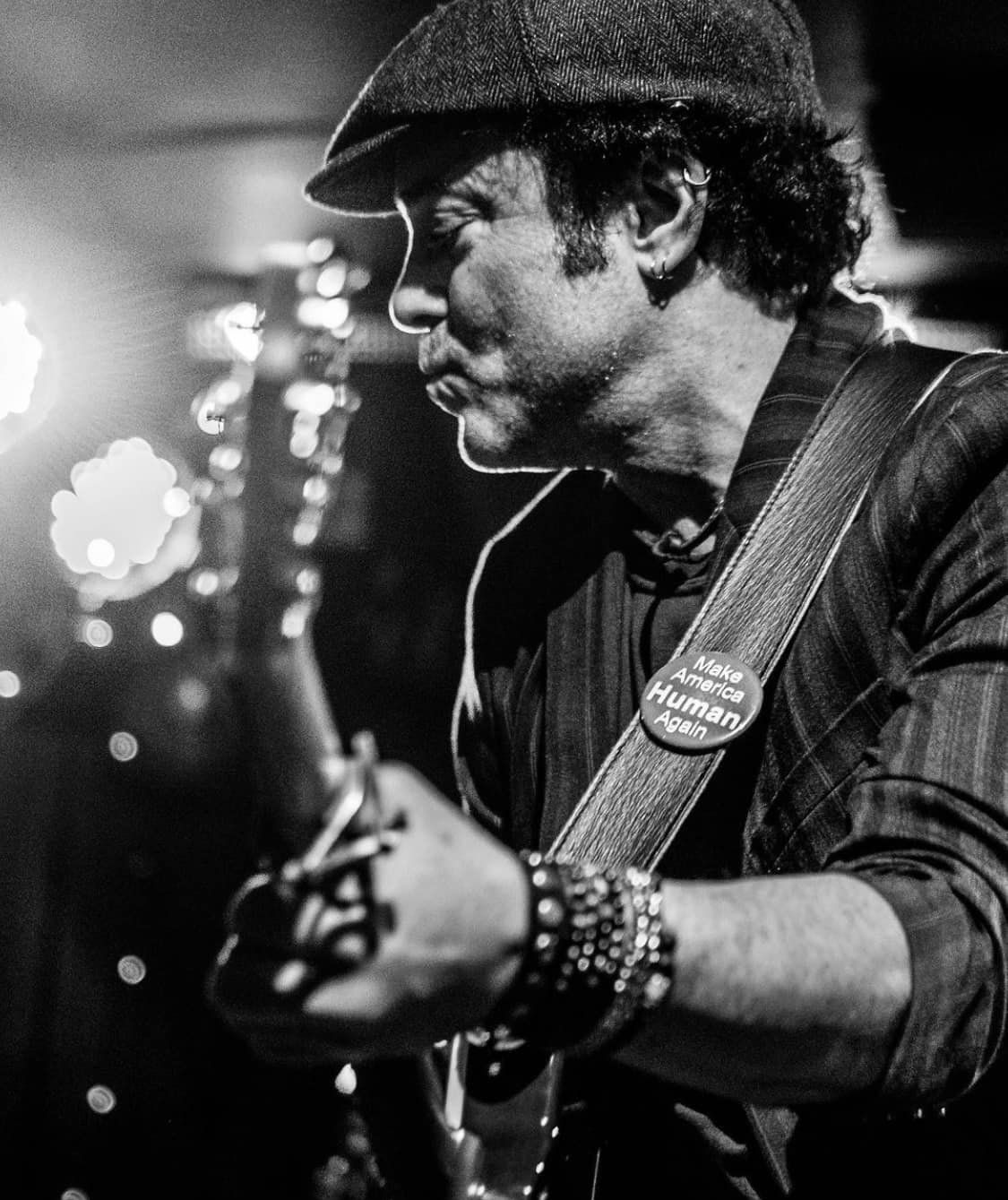
My banjo.
Does your banjo have a name?
Yes, “Pain in my Ass.” It’s very heavy. I mean, a banjo is a ridiculous instrument; It never stays in tune, it’s heavy, fragile, and the neck bends easily. If you tap the bridge, it flattens down and you have to re-string it. It’s a stupid instrument.
Yet, you play one.
I don’t play it traditionally. I’m always using capos and doing weird stuff, so it’s difficult to keep in tune on stage. Sometimes I wish I’d picked up the accordion. Back in the ‘90s when Los Lobos came out with “Kiko,” I loved that album because they played so many different instruments. I remember going down to The Mission in San Francisco where I bought a banjo and a mandolin for 50 bucks. The banjo won.
You’ve turned 60 which is another of those markers that makes you look at where you are and assess. How did turning 60 feel to you?
I feel like I’m at my best now performance-wise. I wish I was playing bigger venues; it’s not where I’d hoped to be. I don’t know how long I can keep doing it at this level until something changes.
Does it seem to you like you’ve been around for sixty years?
My wife has been wanting to compile this baby footage for my daughter. She’s 21 now and I look at her like who is this person. It’s like a whole world away. But, yeah, I feel sixty though I still feel like a kid. I’m very lucky to have been with my wife for 42 years, raised a perfect daughter, still make records and go and play out. We’ve been all over the world. That’s part of the reason I tour because I like to travel.
You must be looking forward to seeing Japan. The Japanese used to be thrilled when American bands played shows there. Budokan was where it was at. Will Colin and Lee Moulding be playing on tour?
The band in Europe will me on vocals, guitar, banjo; Ian Taylor, bass; Jon Bucket, keys; Simon Smalls, drums and Chris Webb, who I’ve never met, guitar. Finding good musicians who can block out time to tour isn’t that easy. After that part of the tour is over, Jon and I will go to Australia.
I read something you said: “It is now science and reason vs. misinformation and cultural beliefs.” Then in ‘A Murder of Crows’ you say, “Because we’re giving up our freedom for temporary safety, A conspiracy of ravens, We’re a murder of crows.”
That was my COVID song. I was trying to show two sides of that binary story. You know, COVID’s not real and you can’t make me wear a mask vs. If you don’t wear a mask, you’re just spreading it and making it worse for everyone else. If you read it lyric by lyric, it’s showing both points of view. Then I started researching names for groups of birds and it’s fascinating. I had a whole list of them. I used ones like conspiracy to illustrate what some people believe, like Bill Gates is putting chips into you when you get the vaccine.
I don’t know what to say about any conspiracies except that during the pandemic a lot of people lost their jobs because they refused to be vaccinated, children lost a year or two of education that they’ll never get back, families and friends were at odds. And that ridiculous story about the coronavirus coming out of wet markets was disproved. There’s no question it came from a lab leak in China.
When it was first happening, science had to figure out what kind of virus it was. It’s not like you just punch some stuff into the computer and it spits out: it’s this kind of virus, this how you get it and this is how you cure it. In the meantime, you keep your distance if someone’s coughing or has a cold. Just like the statistics: In areas where people got the vaccine, deaths and hospitalizations were down. Where people refused the vaccine, they went up.
Mark Twain famously popularized the saying, “There are 3 kinds of lies: lies, damned lies, and statistics.” But let’s move on. Whether or not there is hope for America, at least you appear to have a rosier outlook on your own future, which must be a nice way to get out of bed in the morning.
I’m just excited to have a new album. 2024 has been the biggest year ever for me. I got invited to go play Australia, and Japan. I didn’t seek that
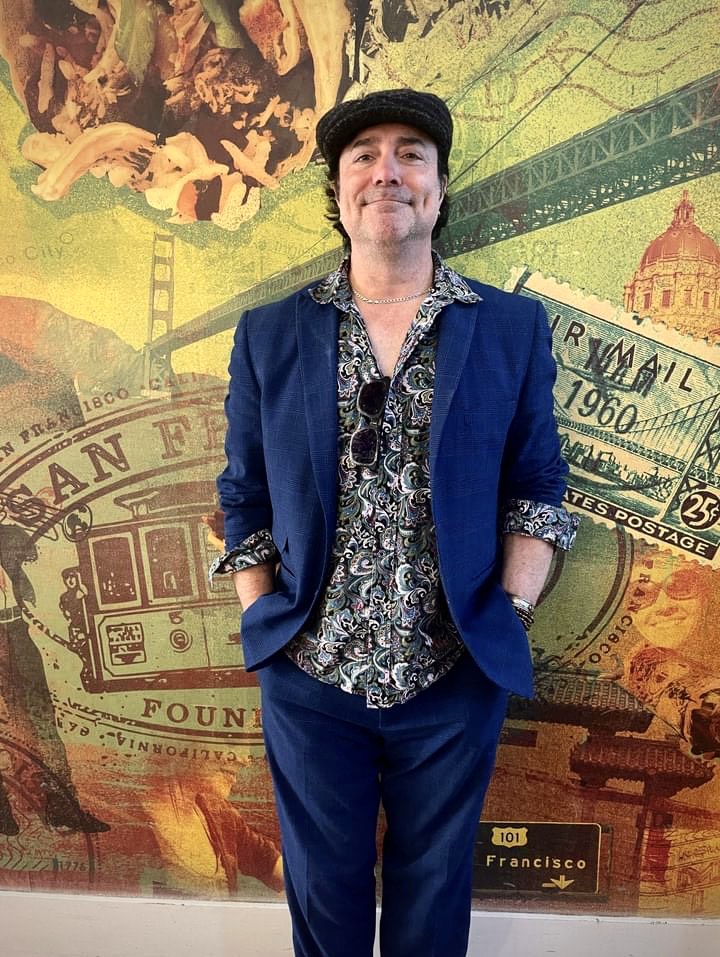
out. I’ve been in nine countries this year. I’ve also finished an album so I’m really optimistic that if I can keep this momentum going through 2025, I can break even on a gig.
To what do you attribute the upswing in your fortunes?
Meeting my band over in England opened me up and people loved it. The calibre of the musicians is extremely high there, and they are really lovely guys. It got me to focus outside of America for now. And it really began with an Americana UK article. 2024 just picked up where 2023 left off. I expanded the band and got busier recording. I retired from music when I was 35 to 42, never thought I would ever be playing again. In my mind at that time, I was over the hill. I got rid of all my gear, went back to art school and raised my daughter. So, this is pretty great.
What got you back into the music business?
I was doing a one-man show as a fine artist in San Francisco. The gallery owner realized I was Scott from Fat Opie. It turned out she was a fan and asked me to play at the opening. I said we weren’t a band anymore, all the while I was thinking maybe it would get more people into the gallery. I got together two guys and we played a makeshift set. I never painted again.


